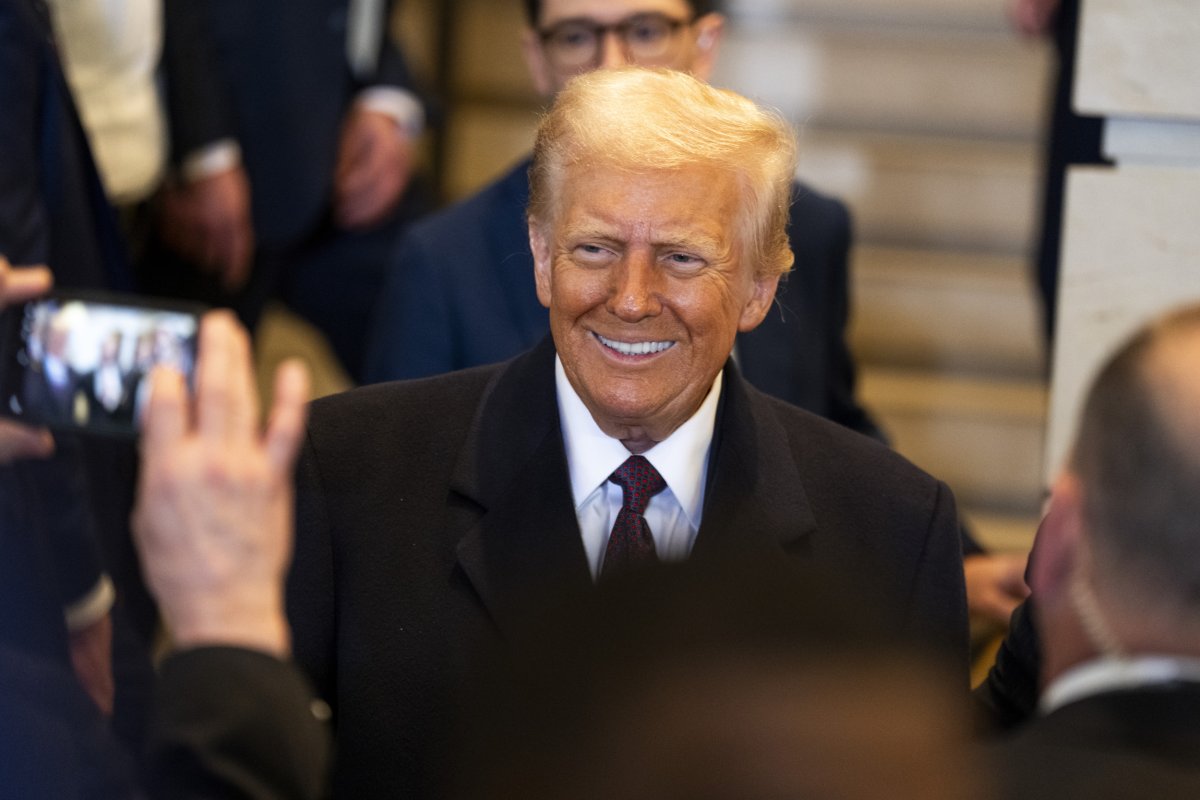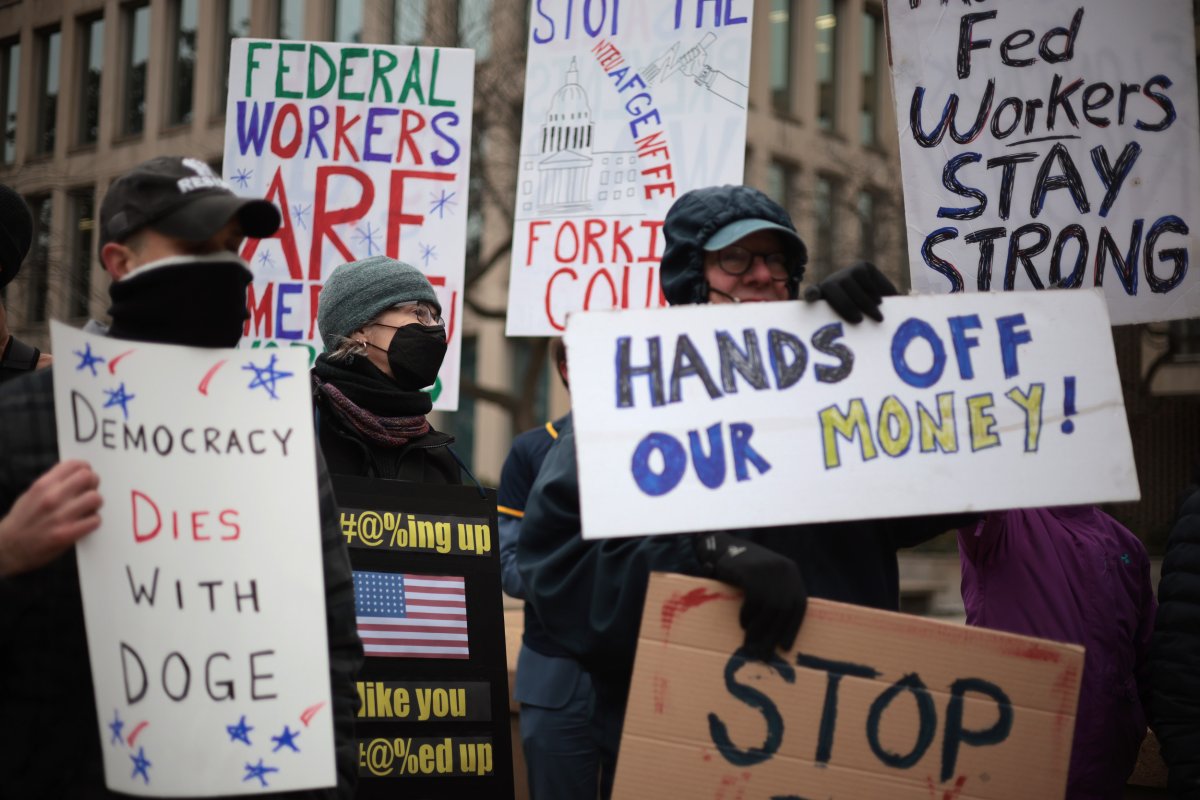President Donald Trump is taking a page out of the playbook used by many of the tech titans who now support him, moving fast and breaking things—all to the delight of his supporters.
Voters who cast ballots for Trump in November told Newsweek they are thrilled over the rapid speed and breadth of the president’s action over his two-and-a-half weeks back in office, applauding him for for “doing everything he said he would.”
“He’s damn near got a checklist and he just going down the line,” Michaelah Montgomery, a Trump supporter and political activist from Atlanta, said in an interview.
With four years out of office to ponder where and how to govern more effectively, Trump took the White House by storm last month, moving immediately on immigration, energy, diversity programs, public health, the federal bureaucracy, TikTok, pardons for those he deemed unfairly prosecuted —addressing many of the exact issues he vowed to tackle on the campaign trail. In 16 days in office, he has signed 45 executive orders, the Federal Register shows.
Jacob Creech, who runs the popular conservative X account @WarClandestine, said even he was shocked and impressed by what he’s seen in the early days of the second Trump administration.
Angela Weiss/Getty Images
“I’m in absolute awe of Trump 2.0,” Jacob Creech wrote on X, formerly Twitter, Monday. “Every time I blink, he lands another haymaker on the Deep State. He is not just draining the swamp, the speed and ease he is doing it with, is gobsmacking. I’ve been saying he would do it, and even I am unable to believe what I’m seeing.”
And it’s not just those hardcore MAGA voters who have stuck with Trump through thick and thin who are responding positively to the speed and sweep of the new administration.
Alan Shindelman, a photographer in New York City, told Newsweek that while he doesn’t necessarily agree with everything he’s seen from the second Trump term so far, there’s been “a lot of movement and action, and I think that’s a healthy thing for the country.”
“Sure, a lot of the policies maybe are not exactly what was promised or the best thing in my personal opinion, but at least I can clearly see [Trump] is there,” Shindelman said.
“The administration is there to do work.”
Polling suggests Shindelman is not alone. Trump is putting up some of his personal best approval ratings, according to polling aggregators like RealClearPolitics and FiveThirtyEight (though he still remains underwater — just barely — in those trackers).
Many in the typically liberal Reddit community have also backed that argument, populating various subreddits with comments like, “Whether you like him or dislike him he did a lot of what he said he’s going to do his first week. For some people that’s bad for some that’s good. I feel mostly happy with his first week and glad he’s more aggressive this time around.”
Others left remarks like, “It’s exactly what I voted to happen,” and “So I won’t try and speak for all of his supporters. But I will say this. He IS acting on all of his campaign promises the best he can so far. If they voted for him for any reason other than he’s a guy I’m sure they are happy.”
Trump is famously sensitive to public opinion and his portrayal in the media, and the White House is paying close attention to the public response to his first few weeks. The administration has even converted the early approval into a new slogan that Press Secretary Karoline Leavitt frequently adopts during her briefings and on social media.
“Promises made, promises kept,” Leavitt said in a Monday recap summarizing Trump’s first two weeks in office. “And we’re just getting started.” She repeated a version of the line in her briefing on Wednesday.
🇺🇸PROMISES MADE, PROMISES KEPT: In just 2 weeks, President Trump is delivering HUGE wins—securing our border, restoring law & order, unleashing energy, and more.@PressSec Karoline Leavitt breaks it down in 95 seconds! ⬇️ pic.twitter.com/0ZkClM2MxQ
— The White House (@WhiteHouse) February 4, 2025
Isabelle Redfield, the co-founder of The Conservateur, a media and lifestyle brand aimed at conservative women, echoed those remarks to Newsweek, adding that, “I’m pleased to report: America is BACK.”
“The promises of this campaign weren’t just words slapped on rally signs — they were a contract. And contracts, when honored, have weight,” Redfield, who is based in Dallas, said.
But Will It Last?
Michael DuHaime, a veteran Republican strategist who ran Chris Christie’s successful campaign for New Jersey governor, told Newsweek that with the majority of Republicans approving of the bulk of Trump’s actions, it’s been “a pretty strong start for Trump among his voters.”
“His voters love the disruption of bureaucrats, attempts to cut wasteful spending, and the strongman presence on foreign policy,” DuHaime said, adding that even though there may be things many dyed-in-the-wool conservatives are less excited about — he mentioned the January 6 pardons — “many will overlook that as long as other things are being done.”
Still, he cautioned that the second Trump term is in its “honeymoon phase.”
“At some point, the rhetoric will need to match results, especially on the economy for his voters to stay happy,” DuHaime said.
While Trump’s supporters are celebrating his early moves, pushback on those actions have been just as swift.
A flurry of lawsuits have been filed over the last two weeks, including those that are seeking to block Trump from disclosing the identity of federal agents who investigated the Capitol riot, from issuing an executive order to end birthright citizenship and from scrubbing data off government sites.
Protesters across the nation also held demonstrations at their state capitols Wednesday to oppose the early actions from the Trump administration, gathering under the hashtags #buildtheresistance. There were protests in Washington during the inauguration as well, though they numbered a fraction of the size of the 500,000-strong Women’s March in 2017.
U.S.A.I.D. D.O.A.
One of the biggest political firestorms of the second Trump term, so far, has been over the U.S. Agency for International Development (U.S.A.I.D.), a 63-year-old agency in the process of being dismantled at the behest of Elon Musk, working on behalf of Trump for the so-called Department of Government Efficiency (DOGE).
Created by President John F. Kennedy at the height of the Cold War, U.S.A.I.D. was set up as an independent agency in 1961. The agency delivers billions of dollars in humanitarian assistance overseas to more than 100 countries. Now, Trump and Musk are working to shut it down as part of an effort to crackdown on “the deep state.”
After Trump criticized the foreign-aid agency as being “run by a bunch of radical lunatics” and Musk called it a “criminal organization,” U.S.A.I.D.’s office in Washington was closed Monday. Its employees were told to work remotely and the agency’s website and X account were taken down. By Tuesday, nearly the entire agency was told they would be put on leave by end of the week, with only “designated personnel responsible for mission-critical functions, core leadership and specially designated programs” kept on.
“Trump is literally Thanos-snapping the Deep State out of existence,” William Wolfe, the executive director of the Center for Baptist Leadership, wrote on X alongside a report that said Trump’s abrupt layoffs was “knocking [U.S.A.I.D. contractors] out of systems so that some vanished in the middle of videoconferences.”
“My heart is full,” Wolfe added in the replies.

Greg Nash/Getty Images
Secretary of State Marco Rubio announced Monday that he is now acting administrator of the U.S.A.I.D., confirming the State Department’s de-facto takeover of the agency.
“I’m loving the reports coming about about the wasteful spending and cutting it off,” Montgomery, the Atlanta activist who helped arrange Trump’s viral stop at a Chick-fil-A in April, told Newsweek. Trump also brought Montgomery, the founder of Conserve the Culture, an organization aimed at mobilizing HBCU students open to conservative ideas, on stage at an August rally in Atlanta.
Redfield, the influencer behind The Conservateur, told Newsweek: “Jaw-dropping is the only way to describe the wasteful spending now being exposed live on TV. This is the transparency Americans voted for — every taxpayer dollar accounted for, no more blank checks for Washington. It’s time to put that money where it belongs — back into our communities, back into America.”
Trump implemented the 90-day freeze on foreign assistance on his first day in office, but a tougher-than-expected interpretation of that order has left aid organizations confused about whether to continue programs.
Republicans have long criticized USAID, traditionally seeking to cut the agency’s funding for peacekeeping, human rights and refugee organizations. In 2023, the U.S. spent about $40 billion in foreign aid, contributing the highest amount of humanitarian assistance globally. Still, foreign assistance amounts to less than 1 percent of the roughly $7 trillion annual federal budget.
“If we are going to have justice, it would look exactly like this. I have no choice but to be excited,” Creech wrote of Trump’s efforts to close the U.S.A.I.D. in a post on X.
A Chainsaw to the Federal Bureaucracy
The purge of U.S.A.I.D. is just one prong of Trump’s efforts to dismantle the federal bureaucracy. For nearly a decade now, the Republican has been vowing to “drain the swamp,” ridding Washington of its establishment figures. After making middling progress on that promise in his first term, Trump appears serious this time around.
Last week, the U.S. Office of Personnel Management offered all federal employees eight months of pay and benefits through September if they resign by February 6. So far, the push to drastically reduce the size of the federal workforce is working — to a degree. Axios reported Tuesday that about 20,000 federal workers, or about 1 percent of the workforce, have already accepted the buyout offers. The White House is hoping that number will climb to 5 to 10 percent before the deadline ends later this week.
If not enough employees take Trump up on the offer, layoffs across the federal government are “likely,” Erv Koehler, assistant commissioner of general supplies and services at General Services Administration, has told staff.

Alex Wong/Getty Images
“Bureaucrats hate it, the American people love it,” Redfield told Newsweek. “This administration is a common-sense revolution moving at lightning speed. Not the Washington of delay and doublespeak, but of results.”
“This is the most transparent and efficient administration in American history,” she added in an email. “The only challenge in writing this email is keeping up. The list of accomplishments in such a short period is staggering. And it’s easy to defend law, order, and American strength — because that’s what the American people overwhelmingly voted for. The mandate could not have been clearer.”
The Trade War That Wasn’t
For months, many had speculated whether Trump would really impose blanket tariffs on America’s two largest trading partners, Canada and Mexico, or if it was all a rouse to get an upper hand in negotiations on the issues of migration and drug trafficking. Despite a few setbacks, Trump has wielded the threat of those tariffs to extract concessions from both countries, even if those concessions had already been in the works under his predecessor.
His latest trade policy was supposed to take effect earlier this week, but a series of last-minute conversations with his Canadian and Mexican counterparts delayed those tariffs for another 30 days. Canada pledged Monday to enact the $1.3 billion border security plan it had proposed in December. And in exchange for the 10,000 national guard troops Mexico agreed to send to its northern border, Trump vowed to helps stop the flow of American-made guns into Mexico.
“President Trump wrote the book on dealmaking,” Redfield said. “The Art of the Deal isn’t just a title — it’s a doctrine. And right now, we are winning at a pace that has left the world scrambling to keep up. America is no longer a pushover; we set the terms. Colombia caved. Canada folded. Mexico bent the knee in record time. When Trump says America First, he means it — every single day.”
Flexing on Latin America
Colombian President Gustavo Petro was, in some ways, the first casualty of the newly empowered MAGA coalition. Last month, Petro engaged in a short-lived standoff with Trump, refusing to accept deported migrants who were being repatriated on military planes. Trump and Marco Rubio, the new secretary of state, quickly threatened the country with tariffs and sanctions targeting Colombian diplomats. Petro immediately backed down, even offering his presidential plane to ferry the deportees from the border.
In the aftermath, Trump posted an image of him in a fedora with the phrase, “FAFO” (“F*** Around, Find Out”), behind him. The phrase is commonly used to warn that actions will lead to consequences.
Montgomery, the Atlanta activist, applauded Trump for helping the U.S. return as a global “superpower.”
“All too long we were being laughed at, and now Colombia, Canada & Mexico all had to FAFO,” she said.

Andrej Ivanov/AFP
In the last two weeks, Rubio has also secured the release of six U.S. hostages in Venezuela, struck a deal with El Salvador to ship detained migrants and imprisoned citizens to the tiny nation and successfully pressured Panama against renewing a trade and development agreement with China.
“This is The Art of the Deal in action,” Redfield said. “No delays. No excuses. Just results. America is done playing defense. We’re leading. We’re winning. And this is just the beginning.”
The Unwinding of D.E.I.
Even before his inauguration festivities had wrapped, Trump had declared that the U.S. would only recognize two sexes from January 20, 2025 onward— taking sides in the culture war in a move Montgomery said let her know “we’re getting things back on track.”
“Trump signed 45 executive orders gutting D.E.I. from government, the military, and federal agencies. Federal workers are back in the office and America will hire based on merit. Not quotas, not identity politics — merit,” Redfield added.
The president wasted no time rolling back orders from the Biden administration that sought to prevent discrimination based on gender identity or sexual orientation, issuing those reversals within hours of being sworn in.
But while none of those moves were surprising for those following Trump’s campaign promises, what did shock many was when he pointed fingers, without evidence, at those same D.E.I. initiatives as the cause of a plane crash over the Potomac River just a week into his second term. An Army helicopter collided with a regional jet flying from Kansas to Washington D.C., killing all 64 people onboard the American Airlines flight and three soldiers onboard the Black Hawk. It was the first commercial air disaster in the U.S. in 15 years.
Addressing the White House press corps in the immediate aftermath — with the investigation barely hours old — Trump told reporters, “I put safety first. Obama, Biden and the Democrats put policy first, and they put politics at a level that nobody’s ever seen.” Asked directly if the crash was the result of diversity hiring, Trump responded, “It just could have been. We have a high standard. We’ve had a higher, much higher standard than anybody else.”
Shendelman put voice to the grumblings of many Americans that day who saw in Trump’s defiant tone a return to his penchant of blaming his political enemies for anything and everything — even in a moment of national mourning.
Blaming the plane crash in D.C. on D.E.I. was “comical,” Shendelman said, adding that while he agreed in a merit-based approach to hiring, “I don’t like the rhetoric or the using it as the reason [the victims are] dead.”

Chip Somodevilla/Getty Images
A Trumpian Mideast Doctrine
While hosting Israeli Prime Minister Benjamin Netanyahu at the White House on Tuesday, Trump left reporters astonished with his suggestion that the U.S. seize control of Gaza and redevelop the area into “the Riviera of the Middle East.” While the remarks have garnered fierce criticisms at home and abroad, Netanyahu told the American president he was “the greatest friend Israel has ever had in the White House.”
And some Trump supports agree.
Shendelman, who said the most important voting issue for him was “protecting Jewish people and combating antisemitism,” said he’s been “very, very pleased to see” Trump’s actions and general rhetoric on Israel.
In general, Shendelman urged Trump to “push [policies] even further [right] than what people might anticipate,” so that the country could “swing back after four years to something kind of in the middle.”
“Both parties offer a lot of benefits to the people, and for better or worse, it’s kind of like a pendulum where, ‘Okay, let it swing, but if you’re gonna let it swing, like, let it swing, really try to implement these change,'” he told Newsweek.
“Then, maybe the next [Democratic] administration, whether that’s in four years or eight years, will bring it back. That’s kind of where I envision a happy medium.”




